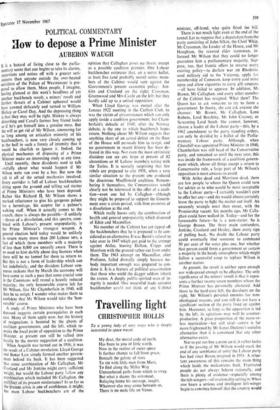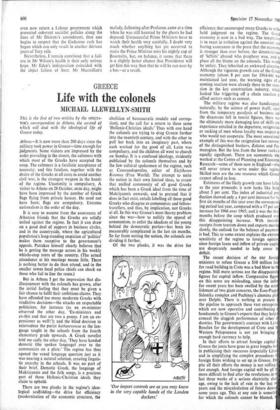How to depose a Prime Minister
POLITICAL COMMENTARY AUBERON 'WAUGH
It is a hazard of living close to the parlia- mentary scene that one begins to take its alarms, excursions and noises off with a greater seri- ousness than anyone outside the over-heated corridors of the Palace of Westminster is pre- pared to allow them. Most people, I imagine, having glanced at this week's headlines of yet another backbench revolt, a miners' revolt and further threats of a Cabinet upheaval would have yawned delicately and turned to William Hickey or Carol Day. And the depressing thing is that they may well be right. Hickey is always disturbing and Carol's former boy friend looks as if he's got himself into a genuine mess. But the will to get rid of Mr Wilson, simmering for so long among an articulate minority of his backbenchers, is now very closely coming up to the boil in such a frenzy of intensity that it would be churlish to ignore it. Indeed, the physical mechanics of disposing of a Prime Minister make an interesting study at any time. Until recently, these dissidents used to talk wistfully about what would happen if Mr Wilson we're run over by a bus. But now the talk is all of the actual mechanics involved. Every corridor is full of Labour backbenchers sitting upon the ground and telling sad stories of Prime Ministers who have been deposed. Rather like Richard II, Mr Wilson shows a marked reluctance to give his gorgeous palace for a hermitage, his sceptre for a palmer's walking staff. When it actually comes to the crunch, there is always the possible—if unlikely —threat of a dissolution, and this spectre, com- bined with Labour's present unpopularity, is the Prime Minister's strongest weapon. A general election held today would be unlikely to return many more than 200 Labour MPS, a fact of which those members with a majority of less than 8,000 are uneasily aware. There is no need to hint darkly about dog licences when there will be no kennel for them to return to. But this is not a form of leadership which can last indefinitely, and the dissident Labour con- sensus reckons that by March the economy will have come to such a pass that some crucial vote to the Commons will reveal a heavily reduced majority; the only honourable course left for Mr Wilson, like Mr Chamberlain in 1940, will then be to resign. I wonder what makes them so confident that Mr Wilson would take the 'hon- ourable' course.
A study of Prime Ministers who have been deposed suggests certain prerequisites in each case. Many of them apply now, but the history of resignations is haunted by the ghosts of coalition governments; and the left, which re- mains the focal point of opposition to the Prime Minister, at present can still be rallied into loyalty by the merest suggestion of a coalition. When Asquith was turned out in 1916, it was the result of a Cabinet revolution. Lloyd George and Sonar Law simply formed another govern- ment behind his back. It has been suggested that some combination of Mr Callaghan, Mr Crosland and Mr Jenkins might carry sufficient Weight, but would the Labour party follow any copab,ination which included Mr Callaghan, the architect of its present misfortunes? In so far as thel4resent crisis is one of confidence, it might; but most Labour backbenchers are of the
opinion that Callaghan poses no threat, except as a possible coalition premier. One Labour backbencher estimates that, on a secret ballot, at least five (and probably more) senior mem- bers of the Cabinet would vote against the Government's present economic policy : Jen- kins and Crosland on the right; Crossman, Greenwood and Mrs Castle on the left: but they hardly add up to a united opposition.
When Lloyd George was ousted after the famous 1922 meeting in the Carlton Club, he was the victim of circumstances which can only apply inside a coalition government, but Cham- berlain's debacle of 1940, after the Norway debate, is the one to which backbench hopes return. Nothing about Mr Wilson suggests that anything short of an actual defeat on the floor of the House will persuade him to resign, and no government in recent history has been de- feated in this way. Not even the most optimistic dissident can see any hope at present of 82 abstentions or 41 Labour members voting with the Tories. It is scarcely surprising that few rebels are prepared to cite 1931, when a very similar situation to the present one produced the disastrous MacDonald coalition. Remem- bering it themselves, the Conservatives would clearly not be interested in the offer of a coali- tion—even one led by Callaghan—although they might be prepared to support the Govern- ment over a crisis period, with firm promises of a dissolution at the end.
Which really leaves only the combination of health and general unpopularity which disposed of Eden and Macmillan.
No member of the Cabinet has yet tipped off the backbenchers that he is prepared to be con- sidered as an alternative. It was Bevin's refusal to take over in 1947 which put paid to the attempt against Attlee, leaving Dalton, Cripps and Morrison with the ground rather cut from under them. The 1963 attempt on Macmillan, after Profumo, failed dismally simply because no- body important enough was prepared to con- done it. It is a feature of political assassination that those who wield the dagger seldom inherit the crown. A deeply public-spirited man of in- tegrity is needed. One mournful trade unionist backbencher could not think of any Cabinet minister, off-hand, who quite fitted the bill.
There is not much light even at the end of the tunnel. Let us suppose that a deputation from the party consisting of John Silkin, the Chief Whip, Mr Crossman, the Leader of the House, and Mr Houghton, the revered elder statesman, in- formed Mr Wilson that they could no longer guarantee him a parliamentary majority. Sup- pose, too, that frantic offers to reverse every existing policy—to declare war on Rhodesia, send military aid to the Vietcong, apply for membership of Comecon, keep every coal mine open and allow cigarettes to carry gift coupons —all have failed to appease. In addition, Mr Brown, Mr Callaghan. and every other member of the Cabinet has resigned. What then? The Queen has to ask someone to try to form a government. In theory, she can ask anyone she chooses: Mr Brown, Mr Callaghan, Lora Robens, Lord Beeching, Mr John Creasey, or Screaming Lord Sutch. She cannot, however, choose a leader of the Labour party—this, by a 1962 amendment to the party standing orders, can only be decided by a ballot of the Parlia- mentary Labour party. Although, when Churchill was appointed Prime Minister in 1940, Chamberlain was still head of the Conservative party, and remained so until the next year, this was inside the framework of a coalition govern- ment which, above all things except a return to Conservative rule, a large part of Mr Wilson's opposition is most anxious to avoid.
With Attlee dead and Morrison dead, there are few people to whom the Queen could turn for advice as to who would be most acceptable to the Labour party—I certainly wouldn't care to offer her any—and she would almost certainly leave the party to fight the matter out itself. An unseemly wrangle must then ensue, with the Premiership vacant. Six months ago, Mr Calla- ghan could have walked in. Today—and for the foreseeable future—he is a non-starter. So is George Brown. The three main contenders, Jenkins, Crosland and Healey, show every sign of pulling back. No doubt the Labour party could eventually find someone to command 50 per cent of the votes plus one, but whether that person could form a government or sustain a majority in the heady atmosphere which might follow a successful coup to replace Wilson is another matter.
At present, the revolt is neither open enough nor widespread enough to be effective. The only significance of the miners' revolt is that it repre- sents a further twenty-seven members whom the Prime Minister has personally alienated. Add those to the hard-core left, the devaluers on the right, Mr Wilson's personal enemies for non- ideological reasons, and you still do not have a significant section of the party lined up against him. Moreover, so long as the opposition is led by the left, its agitations may well be counter- productive. A great proportion of the more-or- less inarticulate—but still vital—centre is far more frightened by Mr James Dickens's socialist alternative than it is convinced that any other alternative exists.
Not to put too fine a point on it, it rather looks as if the passing of Mr Wilson would mark the end of any semblance of unity the Labour party has had since Bevan. resigned in 1951. A reluc- tant awarenesss of this remains the main thing which holds the malcontents back. Frustrated people do not always behave rationally, and there is plenty of evidence—especially among the left-wingers--of irrationality setting in. When one hears a serious and intelligent left-winger begin to convince himself that the country would even now return a Labour government which presented coherent socialist policies along the lines of Mr Dickens's amendment, then one begins to suspect that the Gadarene rush has begun which can only result in another thirteen years of Tory rule. Nevertheless, I remain convinced that a fail- ure in Mr Wilson's health is their only serious hope. Mr Eden's indisposition coincided with the abject failure of Suez. Mr Macmillan's malady, following after Profumo, came at a time when he was still haunted by the ghosts he had deposed. Unsuccessful Prime Ministers have to watch their health very carefully. I doubt very much whether anything has yet occurred to make the Prime Minister miss his nightly cup of Bournvita, but, on balance, it seems that there is a slightly better chance that Providence will get him this way than that he will be run over by a bus—or a revolt.



































 Previous page
Previous page